Jewels
273 Products
-
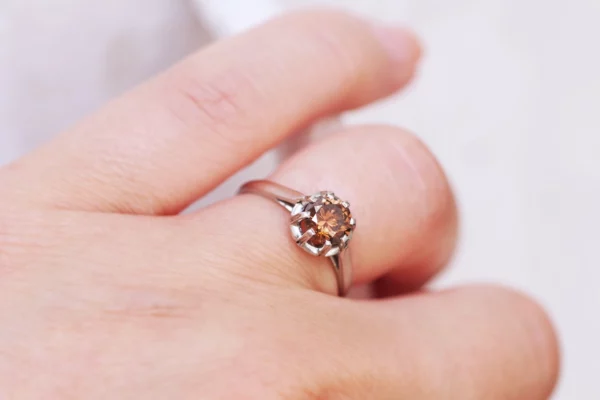
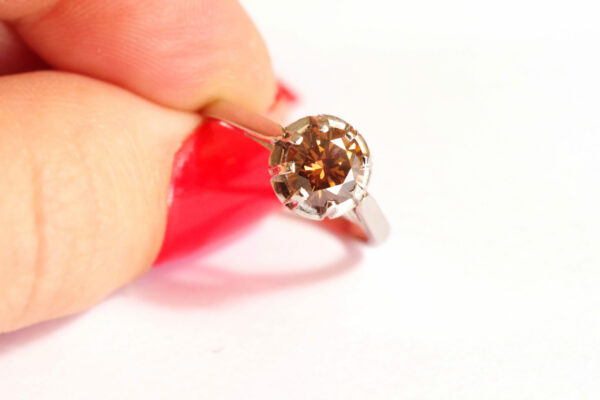 1900,00€
1900,00€Fancy brown diamond ring. Fancy brown diamond ring: a solitaire diamond fancy cognac ring in platinum. This ring is centered on a magnificent brilliant cut fancy diamond, whose brown color sparkles with orange. The diamond weighs 0.79 carat and is set with 8 claws. Antique setting from early 20th, certainly reassembled later with the diamond.
A certificate was established by the French Laboratory of Gemmology on 26/07/2021, of which here are the details below.
Shape : round – brilliant
Dimensions : 5,93 – 6,04 x 3,60 mm
Mass : 0,79 carat
Color: fancy deep brown, slightly orange
Clarity: SI2
Fluorescence: none
Observations: no trace of treatment intended to modify the color. Additional facets. Witnesses of the shape of the rough.Guarantee mark dog head for platinum, goldsmith’s mark partially erased.
Finger size: 49.5 EU or 5 US (sizing possible)
Note: The certificate can be provided upon request, it will be sent to the buyer.
Condition : old trace of sizing
Total weight of the ring : 2,81 gr
*The antique box is not sold with the jewel*
-
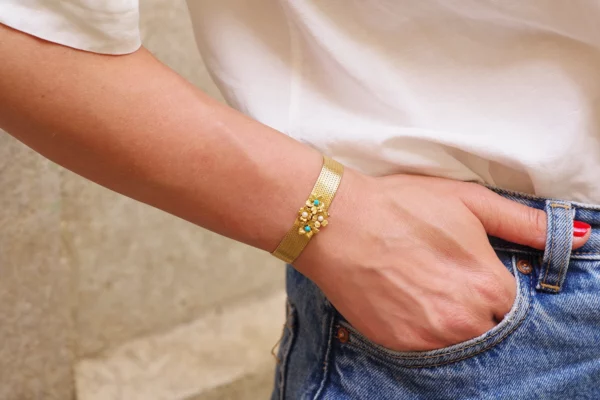
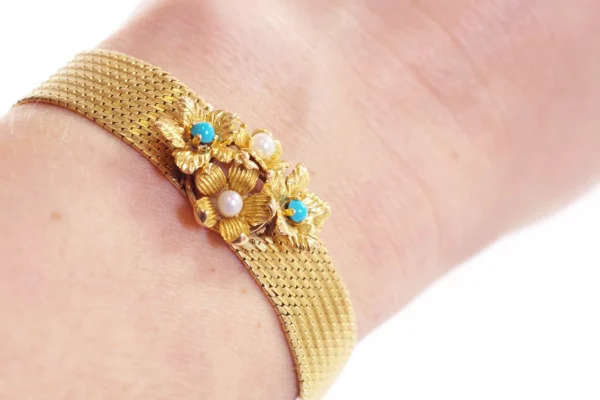
1900,00€1650,00€Turquoises pearls flowers bracelet 18 karat yellow gold (750). Vintage bracelet decorated with four flowers in full bloom, set with cultured pearls and turquoise pearls in their centre. The body of the bracelet is made of soft, flat and intertwined links. It is an old watch bracelet with the flowers integrated afterwards. Vintage bracelet made in the 1980s, France.
Eagle head and goldsmith hallmarks
Total length: 16.3 cm
Width: 11 mm
Design size: 16 x 24 mmCondition: scratches from use
Weight: 24.5 gr
*The antique box is not sold with the jewel*
-
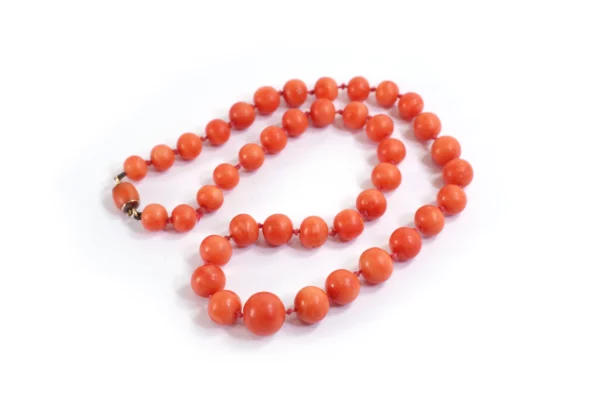
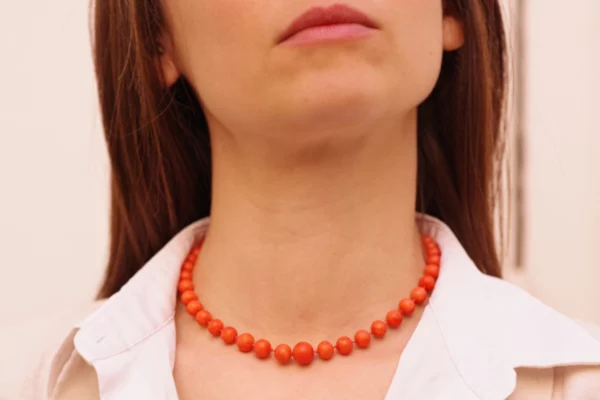 900,00€
900,00€Edwardian coral choker on silk thread. Antique necklace made of 42 coral pearls of an orange colour with pink shades. The clasp is composed of a coral pearl forming a ratchet box with a setting in 18 karat gold (750 ). Antique necklace from the early 20th century, Edwardian period.
Owl hallmark
Length: 38 cm
Diameter of coral beads: 7 to 11 mmCondition : the silk thread has not been replaced
Weight : 28.04 gr
*The antique box is not sold with the jewel*
-
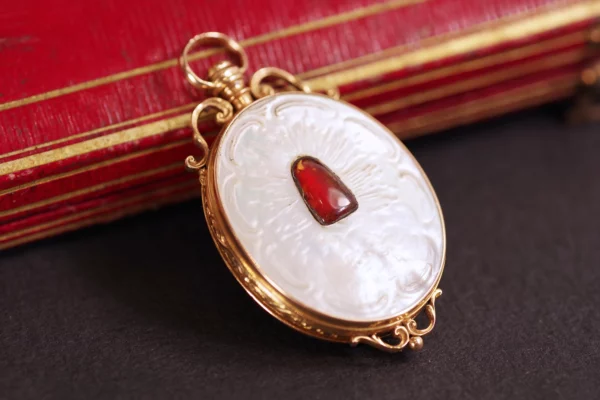
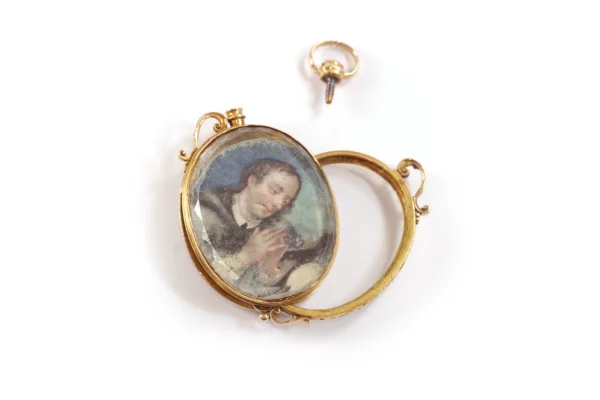 1800,00€
1800,00€Antique reliquary locket pendant in 18k rose gold (750). On one side, the pendant is decorated with a miniature on paper depicting Saint Jerome praying before a cross, with a skull in the foreground. The miniature is protected by a beveled oval glass. The reverse features a chased oval mother-of-pearl plate adorned with a carnelian cabochon on red foil, set in the center of the composition. It forms the heart of Christ, in a radiating motif engraved in the mother-of-pearl. The medallion is decorated with fine chasing on the edge, which opens secretly by unscrewing the ring-like upper part. Antique medallion, probably French, dating from the late 18th century.
Owl hallmark (later add).
Dimensions: 43 mm x 25 mm
Condition: vellum miniature in poor condition, possibly restored or removed. Scratches from use.
Weight : 12.49 gr
*The antique box and the chain are not sold with the jewel*
See our antique chains -
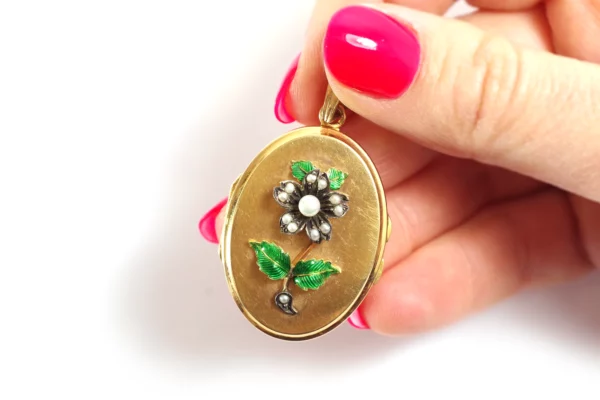
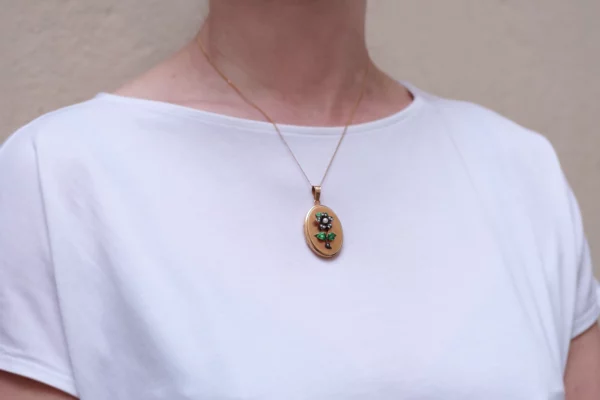 1100,00€
1100,00€Victorian flower locket pendant in rose gold 18 karats (750) and silver. Antique locket pendant with an oval shape decorated with a flower in relief, made of silver and gold, set with fine pearls. The leaves are in green enamel. The pendant opens onto a compartment that can hold a photograph protected by a glass. 19th century memento souvenir pendant.
Eagle head hallmark
Dimensions (including the clasp) : 45 mm x 25 mm x 5 mm
Condition : scratches from use
Weight : 11.06 gr
*The antique box and the chain are not sold with the jewel*
See our antique chains -
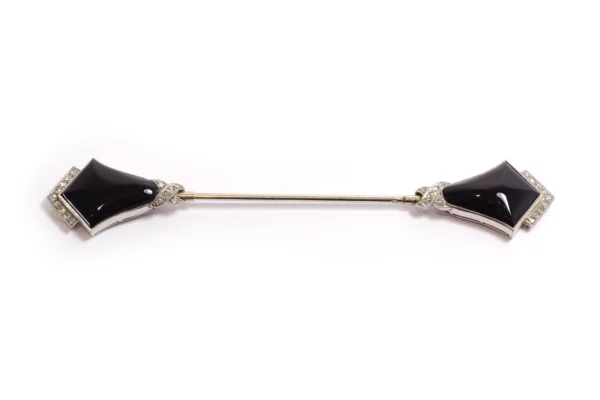
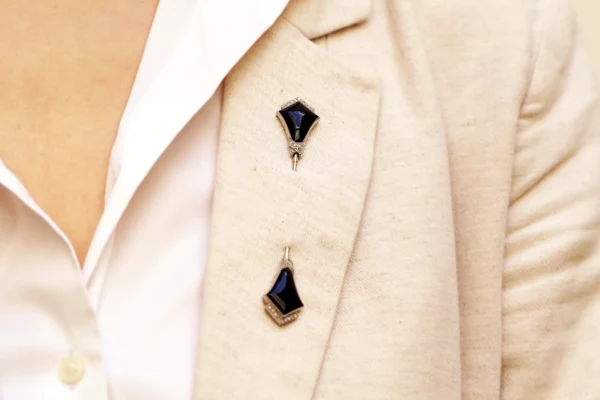 2000,00€
2000,00€Art Deco onyx jabot pin in platinum. Pin set with two cabochon-cut onyxes surrounded by 30 rose-cut diamonds. The jewel adopts a geometrical shape and colors typical of the Art Deco period. French Art Deco jabot pin, circa 1930.
Dog head hallmark
Total dimensions: 98 mm x 15 mm
Dimensions of one design: 15 mm x 26 mmEstimated diamond weight : 0,15 carat
Condition : fine traces of glue below onyx, scratches from use
Weight : 8.35 gr
-
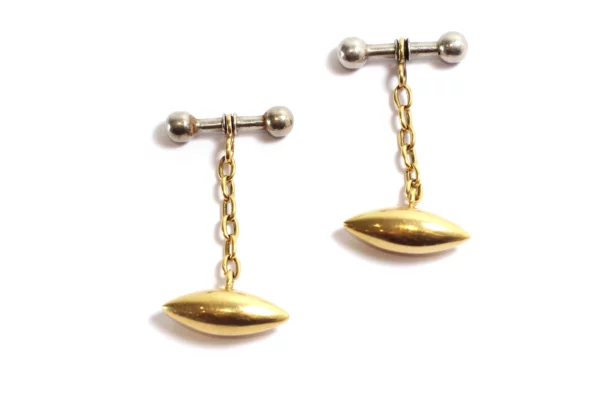
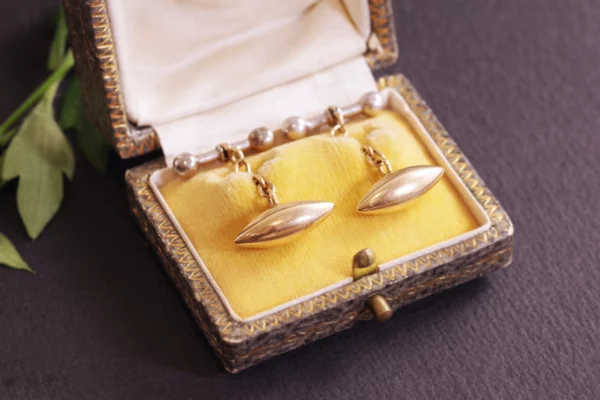 470,00€
470,00€Vintage gold cufflinks in yellow and white gold 14 karats (585). Pair of two-tone cufflinks, a part forming a bar holds by a chain to an oblong shape with pointed ends. Cufflinks of the middle of the 20th century, Retro period.
Shell hallmark (14k)
Dimensions : 33 mm x 18 mm
Weight : 6.44 gr
*The antique box is not sold with the jewel*
-
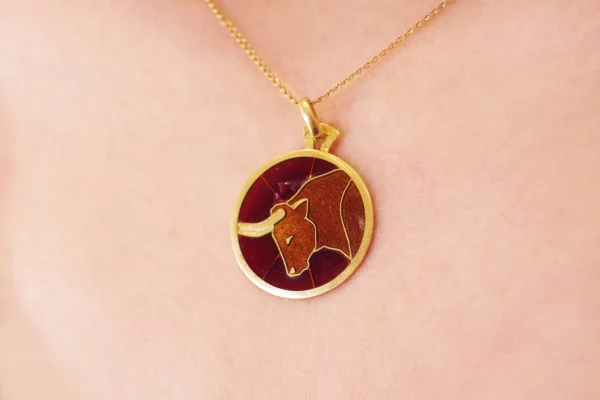
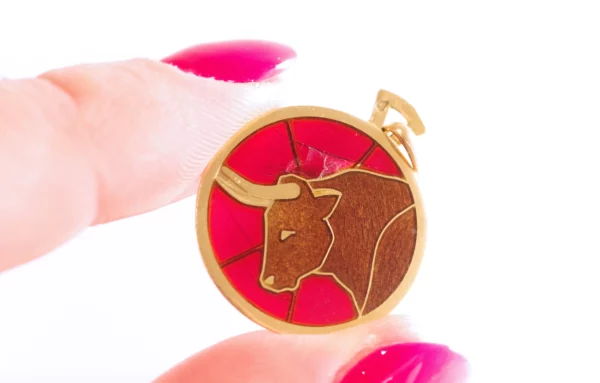 590,00€
590,00€Arthus Bertrand Taurus zodiac enamel pendant plique à jour in yellow gold 18 karats. Art Deco medal pendant of the zodiac sign Taurus. The bull is represented in gold with light brown enamel plique-à-jour decoration on a red translucent enamel background. Vintage astrological medal, circa 1960, France.
Eagle head hallmark and Arthus-Bertrand & Cie (active in Paris) goldsmith hallmark, stamped “France” and marked “18k” on the reverse.
Dimensions (including the clasp): 27 mm x 20 mm
Condition: chip and partial crack in the enamel above the bull’s neck (approx.5 mm)
Weight : 2.55 gr
-
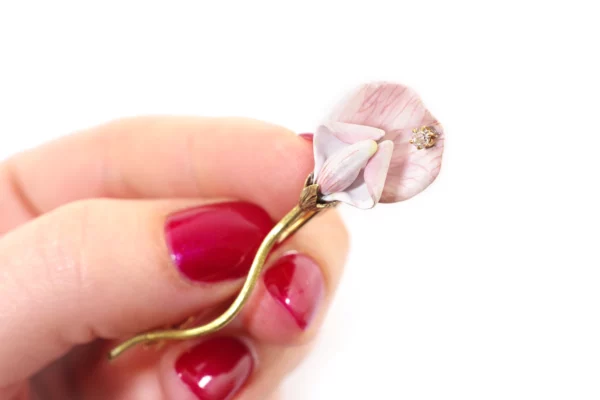
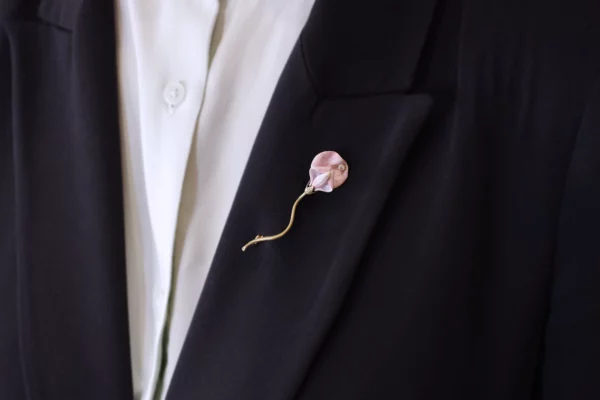 1300,00€
1300,00€Enamel American flower brooch in Tiffany & Co’s style in rose and yellow gold 14 karats. Antique brooch representing a sweet pea with pink petals enamelled and matt. The representation of the flower is very naturalistic. On the flower, a diamond is set by six claws in yellow gold. American work, in the style of Paul Farnham for Tiffany & Co, circa 1890.
Scallop shell and trefoil hallmark
Size: 58 mm x 16 mmEstimated diamond weight: 0.05 ct
Note: the clasp is in rose gold 9k
Condition : scratches from useWeight : 5.18 gr
*The antique box is not sold with the jewel*
-
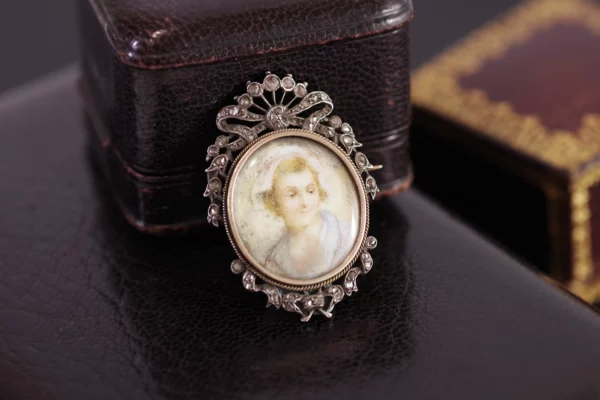
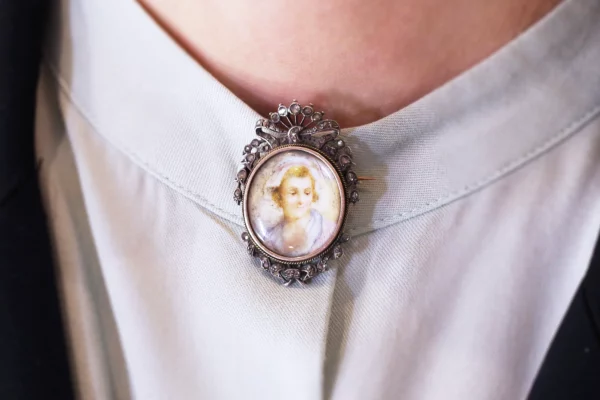 620,00€
620,00€Victorian portrait diamonds brooch in silver and rose gold 18 karats (750). Antique brooch with a lady’s portrait painted on ivory and protected by a glass. The portrait is surrounded by a pink gold border and a silver decoration forming a knot and foliage, set with 54 rose-cut diamonds. Late 19th century antique portrait brooch, Victorian period.
Owl and swan hallmarks
Dimensions : 35 x 25 mm
Dimensions of the portrait : 21 x 18 mmCondition : tiny scratches.
Weight : 7.20 gr
*The antique box is not sold with the jewel*
-
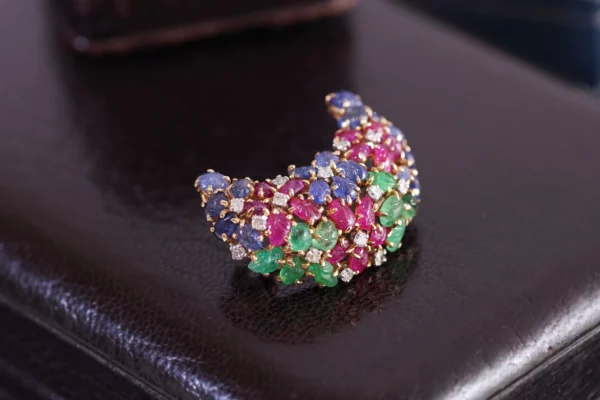
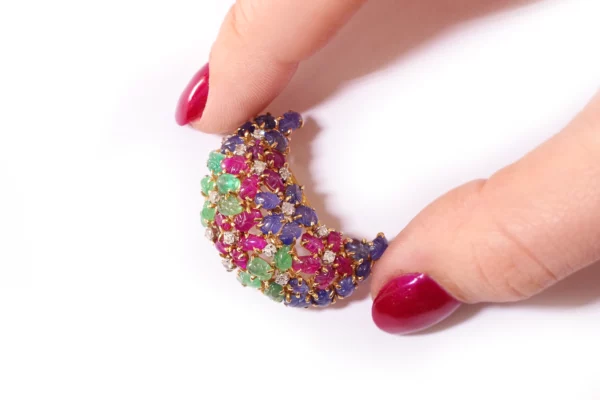 4600,00€
4600,00€Art Deco Tutti Frutti clip brooch in 18 karat gold (750) and platinum (900). Brooch taking the form of a crescent moon, decorated with flowers stylized by petals carved with sapphires, rubies and emeralds, the pistil represented by single cut diamonds. This brooch is composed of fourteen rubies, seventeen sapphires, nine emeralds and fourteen diamonds. Art Deco brooch, in the style of Cartier Paris Tutti Frutti jewelry, circa 1925
Eagle head hallmark, dog head hallmark and illegible goldsmith’s hallmark.
Dimensions : 25 x 32 mm
Estimated weight of sapphires : 2.55 carats
Estimated weight of rubies : 2.10 carats
Estimated weight of emeralds : 0.90 carats
Estimated weight of diamonds: 0.28 caratCondition: scratches from use
Weight : 8.69 gr
-
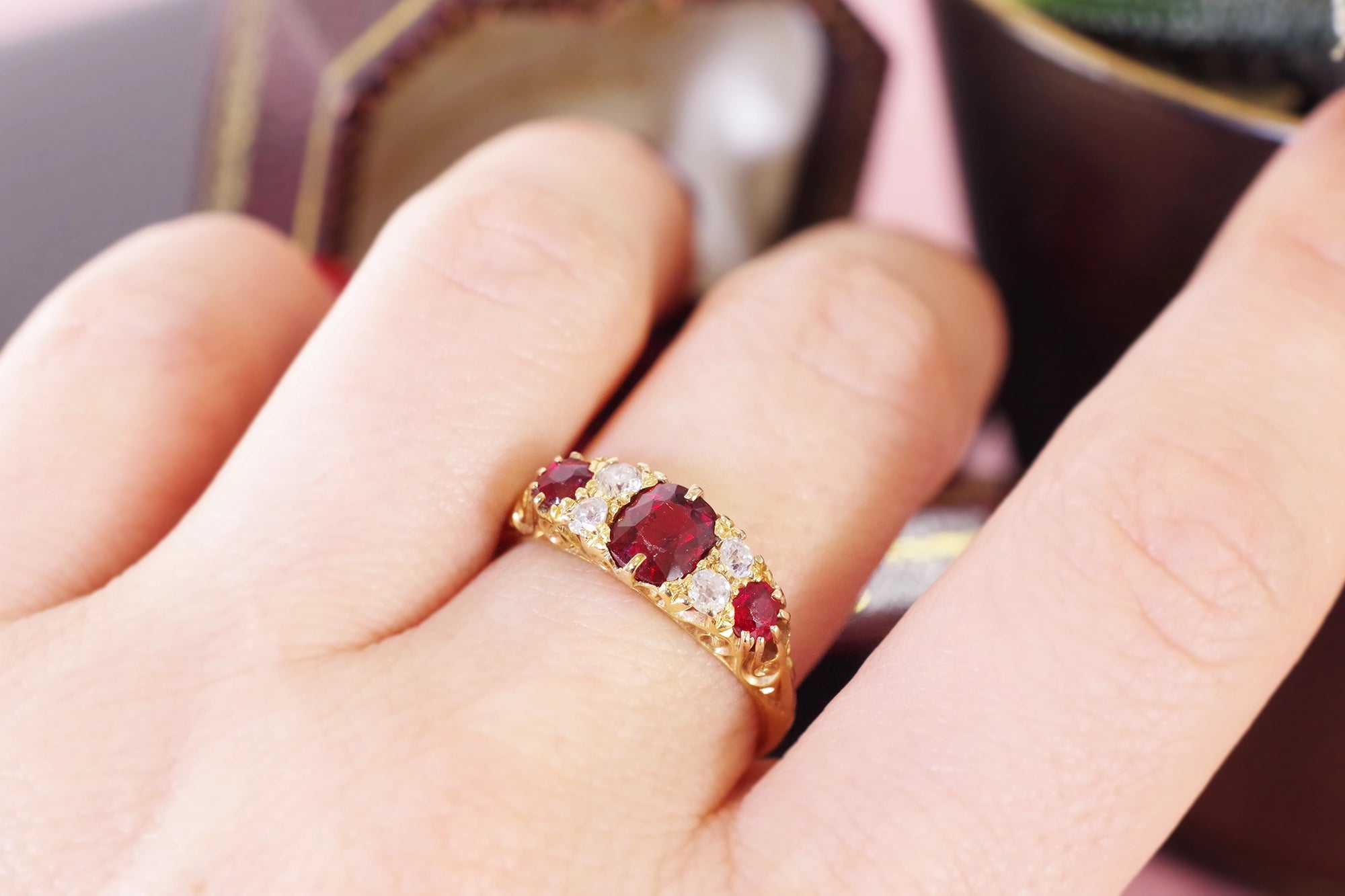
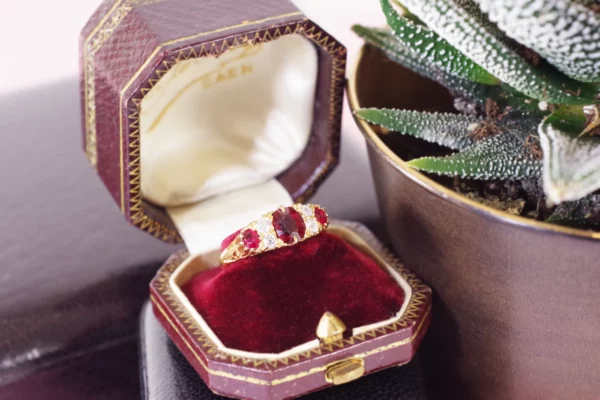 850,00€
850,00€Red spinel trilogy ring 18 karat yellow gold. Three oval spinels adorn the ring, between each spinel are four old cut diamonds. The spinels have a beautiful dark red colour. The ring is finely chiselled on the gallery and shoulders, with a floral and scroll design. This ring is in the spirit of English Arts and Crafts. Early 20th century ring, probably England.
Owl hallmark, Marked 750, partially erased
Finger size: 52 EU or 6 US (can be cut changed)
Width of the ring : 7 mm
Weight of the central spinel : 0,94 caratTotal estimated weight of spinels : 1,32 carat
Total estimated weight of diamonds : 0.19 caratWeight : 3.40 gr
